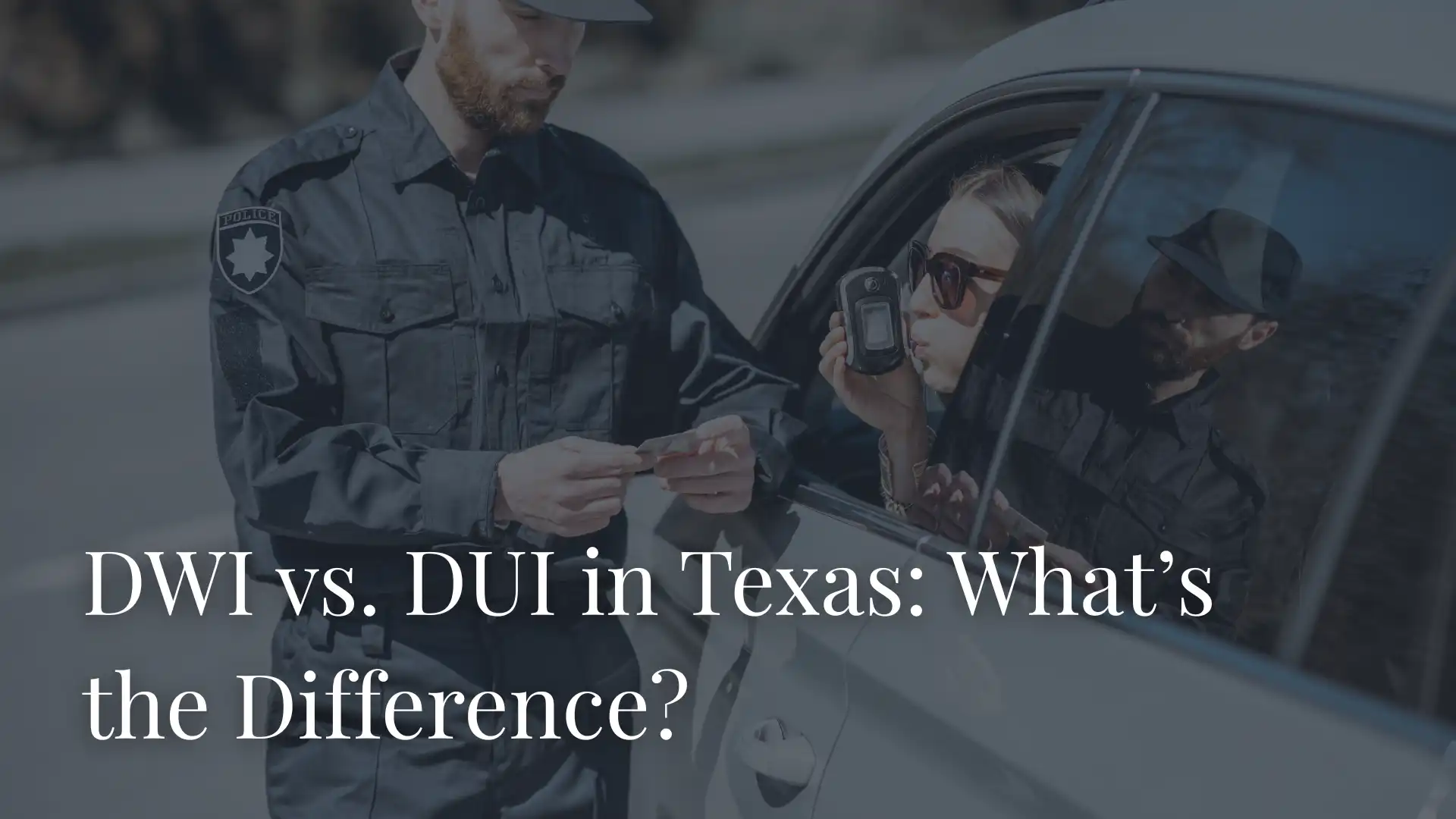
In casual conversation, most Texas residents use the term “DUI” when referring to the offense of drunk driving. However, ‘DUI’ has a specific legal definition under Texas law, and understanding the difference between DWI vs DUI in Texas can help you know what charges you’re actually facing and what penalties might apply. The same goes for “DWI.” Knowing these terms and their differences is essential for mounting an effective defense against
drunk driving charges in Dallas.
Key Differences Between DWI and DUI in Texas
In Texas, the term for what most people call “DUI” is actually “DWI,” or “Driving While Intoxicated.”
State law defines DWI as being “intoxicated while operating a motor vehicle in a public place.”The police have two methods for making DWI arrests. The first is if they pull over a suspected drunk driver and test their blood or breath. If the test reveals the driver has a blood alcohol concentration (BAC) of 0.08 percent or higher, the driver is automatically considered intoxicated.However, a BAC of 0.08 or higher is not strictly necessary for the police to arrest someone. The Texas penal code says the definition of “intoxicated” includes “not having the normal use of mental or physical faculties because of the introduction of alcohol” or other substances. In other words, the police can arrest anyone with enough evidence that a driver can’t safely handle their vehicle.While DWI is the term for most Texas drunk driving cases, there are situations where “DUI” (“driving under the influence”) applies. For instance, the
Texas law against underage drinking refers to “Driving or Operating Watercraft Under the Influence of Alcohol by Minor.”Due to the statute’s wording, “DUI” is the correct term for drunk driving cases involving underage drivers. Otherwise, ‘DWI’ is usually the official legal term for a drunk driving charge. What is the difference between a DUI and DWI in Texas? It mainly comes down to the driver’s age and the specific circumstances of the offense.
Can You Be Charged With Both in Texas?
It’s possible to face DWI and DUI charges simultaneously, but it’s rare. Because the Texas DUI statute only applies to underage drivers, prosecutors can charge them with DUI and DWI for the same incident. However, prosecutors rarely do this because it’s unnecessary and can create issues with the
Fifth Amendment’s rules against double jeopardy. (The “double jeopardy” rule means you can’t face criminal charges more than once for the same offense.)Drivers 21 and older can’t face DUI charges because that specific statute doesn’t apply to them. However, older drivers could face other charges related to whatever led to their DWI charge. For example, a driver could face a separate charge for having an open container of alcohol in their vehicle.
Legal Consequences of DWI or DUI
In most cases, a first-time DWI charge is a Class B misdemeanor. Penalties for
Class B misdemeanors in Texas include:
- Up to 180 days in jail
- A fine of up to $2,000
Other potential penalties in DWI cases include:
- A one-year driver’s license suspension
- Mandatory installation of an ignition interlock device (meaning you can’t start your car until you show you’re sober)
- Mandatory alcohol abuse counseling
DUI is a Class C misdemeanor in Texas. A driver under 21 convicted of DUI could face a fine of up to $500, though jail time is unlikely. However, a driver with two or more prior DUI convictions could face harsher penalties, including:
- A fine between $500 and $2,000
- Up to 180 days in jail
Finally, any minor
convicted of DUI must perform community service. The number of service hours depends on the driver’s prior criminal history. Those without prior convictions must serve 20-40 hours of community service, while those with previous convictions must serve 40-60 hours.
What To Do After an Arrest on Suspicion of DWI or DUI
DUI and DWI charges in Texas carry hefty penalties, so you want to avoid doing anything to worsen your situation. Here’s what to do after the police take you into custody:
- Invoke your right to remain silent. Politely tell the police and prosecutors you won’t answer questions without a lawyer, then stop talking. Remember, they can use anything you say against you later.
- Be careful about refusing a post-arrest breath or blood test. The authorities might still have enough evidence to convict you, and rejecting a post-arrest test will lead to an automatic driver’s license suspension.
- Don’t talk to other inmates about your case. Conversations in jail aren’t private and could hurt you later.
- Avoid signing anything without understanding it. Wait to talk to your attorney first so you don’t accidentally hurt your case or waive your rights.
- Write down everything you remember. Include what the officer said or did and the timeline of your arrest. This information can help your defense if you show that the police violated your rights.
- Ask for a lawyer immediately. A defense attorney can guide you through each step of the legal process while protecting your rights.
Defense Strategies for DWI vs DUI Texas Charges

No two DUI or DWI cases are identical, and your lawyer can help you determine what defense best fits your circumstances. Some potential defense strategies include:
- Faulty field sobriety tests – A skilled attorney can point out factors like nerves, medical conditions, or uneven surfaces affecting field sobriety tests.
- Unlawful traffic stop – Your attorney could have dismissed the entire case if the police didn’t have a valid reason to pull you over.
- Improper breathalyzer use – Your lawyer can argue that the test results should be thrown out because the equipment was damaged or improperly maintained.
- Medical conditions – Acid reflux, diabetes, or specific diets can mimic intoxication or skew breathalyzer test results.
- Violation of rights – If the officer fails to read your Miranda rights or pressures you into speaking without a lawyer, your attorney can argue that your statements should be excluded.
- Chain of custody issues – Mishandled or poorly stored blood samples can lead to inaccurate lab results.
- Witness testimony – Friends, passengers, or medical experts can help challenge the officer’s version of events to show you weren’t intoxicated.
Contact Our Dallas DWI/DUI Defense Lawyers
My Dallas Criminal Lawyer has decades of combined defense experience and a proven record of success in DUI and DWI cases. Let our
DWI defense lawyers in Dallas protect your rights and guide you through this legal storm to a safe harbor. Our team is here to
help you understand your rights and take the first step toward securing the necessary benefits. Call
214-949-4117 or complete our
contact form for a free consultation.
 In casual conversation, most Texas residents use the term “DUI” when referring to the offense of drunk driving. However, ‘DUI’ has a specific legal definition under Texas law, and understanding the difference between DWI vs DUI in Texas can help you know what charges you’re actually facing and what penalties might apply. The same goes for “DWI.” Knowing these terms and their differences is essential for mounting an effective defense against drunk driving charges in Dallas.
In casual conversation, most Texas residents use the term “DUI” when referring to the offense of drunk driving. However, ‘DUI’ has a specific legal definition under Texas law, and understanding the difference between DWI vs DUI in Texas can help you know what charges you’re actually facing and what penalties might apply. The same goes for “DWI.” Knowing these terms and their differences is essential for mounting an effective defense against drunk driving charges in Dallas. No two DUI or DWI cases are identical, and your lawyer can help you determine what defense best fits your circumstances. Some potential defense strategies include:
No two DUI or DWI cases are identical, and your lawyer can help you determine what defense best fits your circumstances. Some potential defense strategies include:




